Science & Innovation
Keda Suremaker, Ma’anshan, Anhui Prov., China
The utilization of solid waste makes AAC more competitive
Loading...AAC is a lightweight, porous silicate wall material made from silicon-containing materials (sand, fly ash, or various silicon-containing tailings, etc.), lime, cement, and materials like aluminum powder, through a series of production processes. Beyond the traditional production process formula, AAC can also fully utilize solid waste as raw materials for production. To promote the development of a green circular economy and improve the utilization rate of solid waste, the Keda Suremaker Process Experiment Center has researched and developed different production process formulas. These utilize fly ash, ceramic tail mud, slag, granite, lead-zinc tailings, metal tailings, construction waste, and stone powder as siliceous materials to produce AAC products.
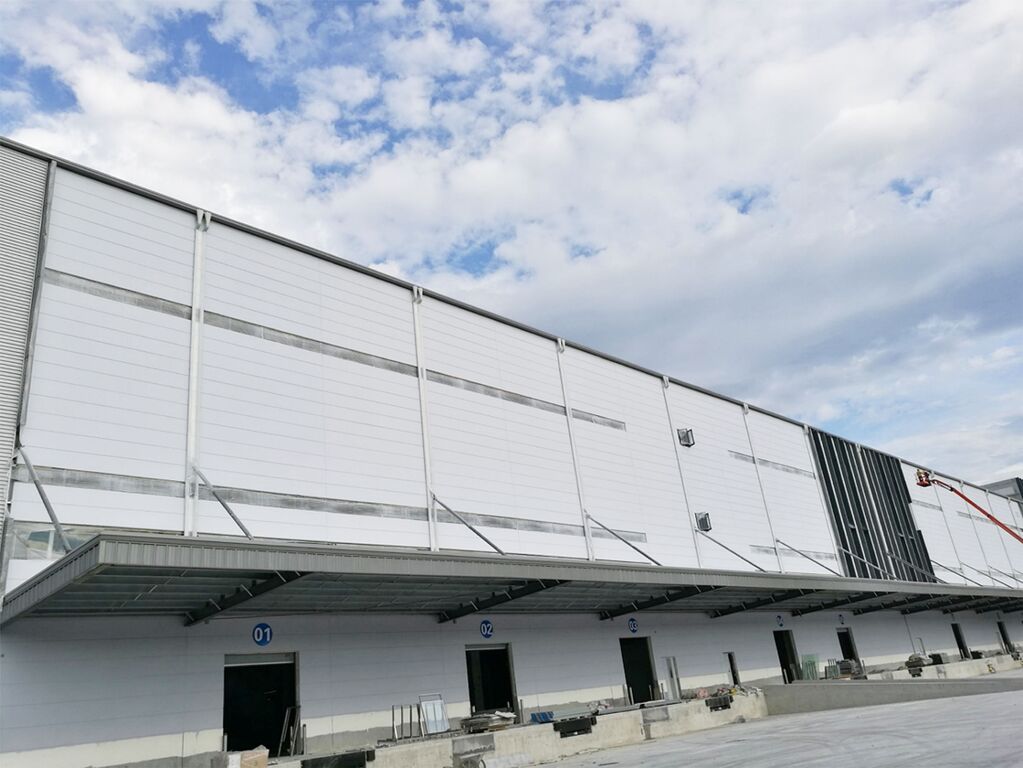
In China, the utilization of solid waste in the AAC industry is very extensive. The use of various solid wastes, such as fly ash, granite, incinerated domestic garbage, ceramic polishing mud, lead-zinc tailings, gold tailings, fluorite tailings, and stone powder, has reached 100 million tons. The consumption of solid waste as raw materials can account for up to 48% of the total raw material consumption. In AAC products mainly made from fly ash, the proportion of industrial solid waste exceeds 70%, making it one of the building materials that absorb the most industrial solid waste.
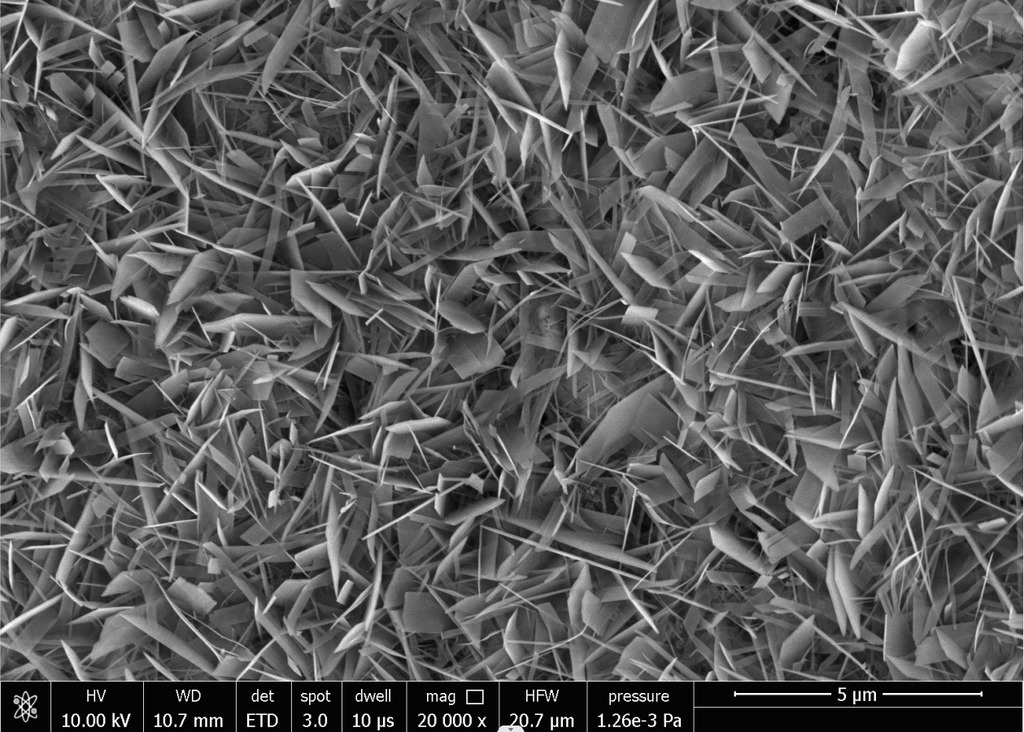
Fly ash is the main solid waste discharged from coal-fired power plants. The variation in fly ash properties due to different factors such as coal types and coal-fired boilers poses significant challenges in using it to produce AAC panels. Compared to sand-based AAC panels, fly ash-based AAC panels have a narrower requirement for softness and hardness of the cake, which can easily lead to cracking during cutting; fly ash-based AAC panels are prone to vertical cracks in the middle of the grooved surface, requiring improvements in the plasticity of the cake, a reasonable particle size distribution, and the use of medium-speed lime. For high-alumina fly ash (alumina content over 35%), a stable production process has been obtained through the adjustment of key parameters. Based on theoretical research and numerous experiments, Keda have used fly ash as the sole siliceous material in Henan Xing'an, Inner Mongolia Huifang, Ningxia Zhongsheng, Datong Hezheng and other projects to produce fly ash-based AAC panels, achieving high quality of these products.
“Ceramic tile polishing mud is a waste material produced during the grinding and polishing process of polished tiles. This polishing mud has a very fine granularity and, after the water evaporates, becomes dispersed, easily carried by the wind to various places, causing serious pollution to the surrounding environment. In Keda´s project in Shandong, China - Shandong Heyue, the client made full use of the waste materials from ceramic production. The produced AAC insulation panels have a compressive strength of ≥ 0.4 MPa, a thermal conductivity of 0.045 W/(m·K), and a density of 150~170 kg/m3. This type of panel is often used in the middle layer of thermal insulation walls.
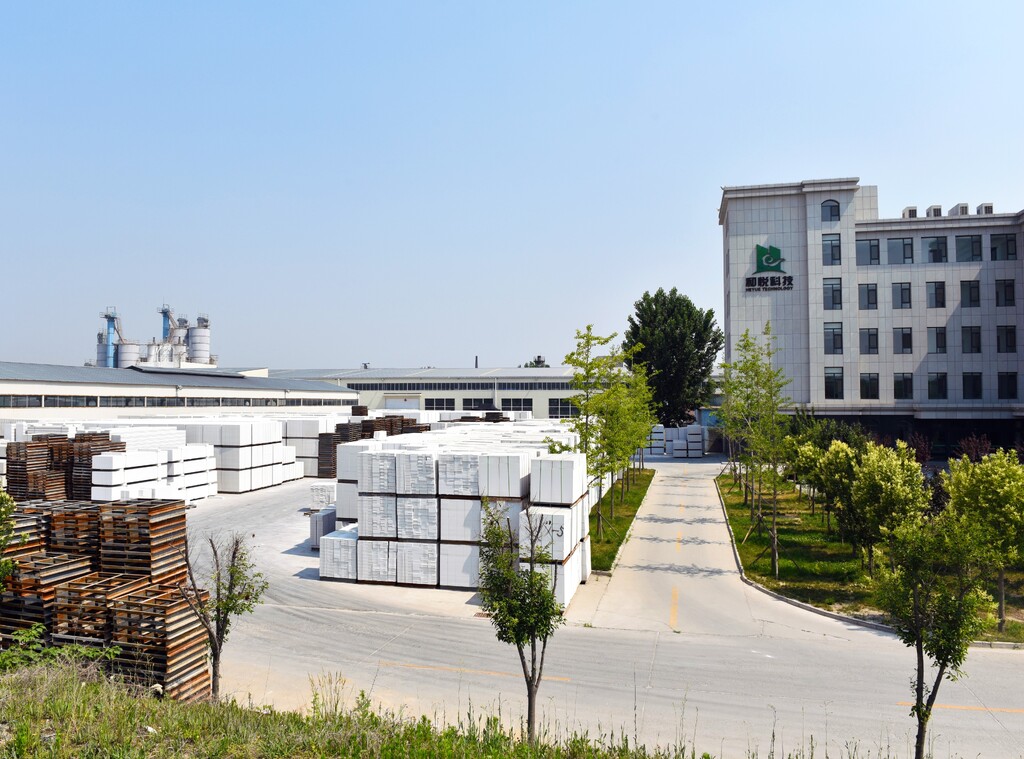
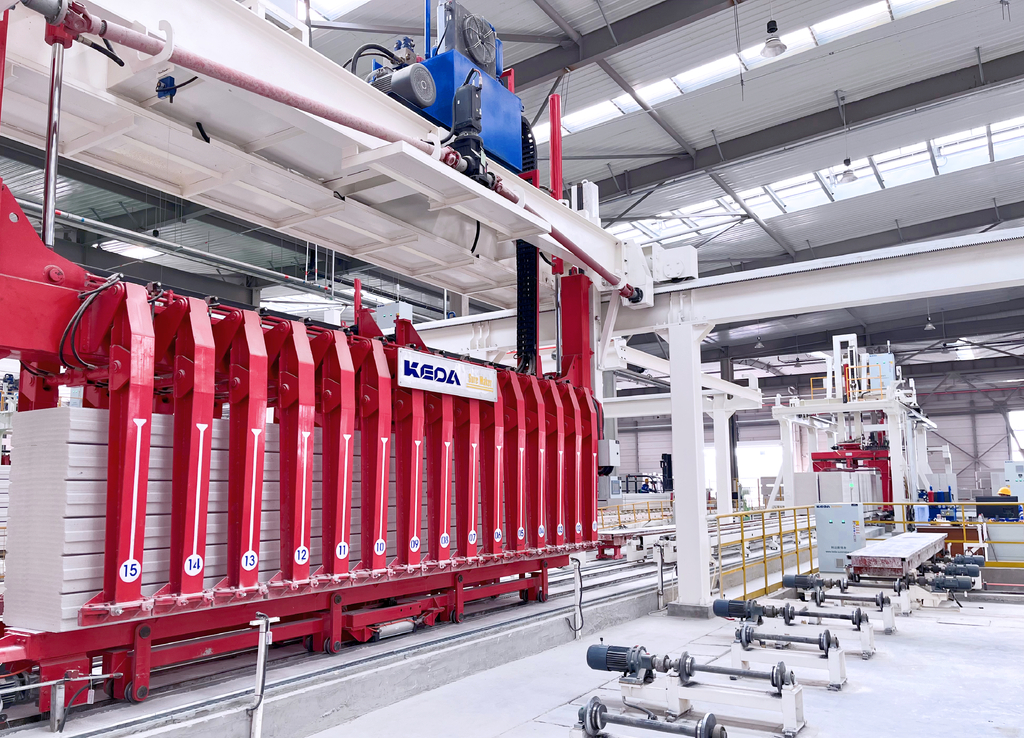
"We started our collaboration with Keda in 2015 and currently have two AAC production lines provided by Keda, with a total annual production capacity of 1 million cubic meters of blocks and panels. We can consume 472,000 tons of ceramic tailing per year. The Keda Suremaker process experiment team also offered us many valuable suggestions at the beginning of the project. Although the project does not use traditional sand, the quality of our products is still maintained at a very high level. Keda's excellent systematic service and support to our manufacturing plant have made our cooperation very pleasant," said Mr. Li, Managing Director of Shandong Heyue New Building Materials Co., Ltd.
“Our company initially did not venture into the AAC manufacturing industry, but we had a large amount of fluorite tailings that needed to be dealt with. While seeking suitable solutions, we encountered Keda, a company with a professional process experiment & research ablility. They conducted lab and pilot-scale trials for us, and eventually, we completely replaced traditional silica materials with fluorite tailings to produce high-quality AAC products. This brought immense economic value to our enterprise, as it significantly reduced our raw material costs. Additionally, our thorough processing of solid waste garnered societal support and encouragement. We are extremely grateful to Keda for their research in process technology, as their meticulous study in the field of solid waste helped us overcome this challenge. Our project launched in 2015, with an annual production capacity of 300,000 cubic meters of AAC products. It has been in operation for 8 years now, continuing to bring us stable investment returns. Due to the efficient utilization of mineral resources, we have been awarded the title of National Mineral Resources Comprehensive Utilization Demonstration Base.” said the CEO of Zhejiang Wuyi Changsheng, Mr. Wu Gang.

“We are delighted that the Keda Suremaker process experiment team provided effective support and assistance to our clients in the Wuyi Changsheng project. Ultimately, this enabled 100% utilization of the client's fluorite tailings instead of discarding them. This represents progress in technological development and is a testament to the success of our work. Keda Suremaker’s process research laboratory receives about 600 samples from all over the world. Although not all materials meet production requirements, we conduct professional testing on each client's sample, including measurements of SiO2 content, loss on ignition, clay content, etc., to ascertain whether they meet the necessary standards. Afterwards, we issue a laboratory report to the client and offer advice on the process formula to help them use solid waste as a silica material, fully or partially, without compromising product quality and environmental health. We collaborate closely with our clients and have many successful cases where waste has been used as raw material. For example, in our project in Jining, Shandong, we help the manufacturer to use the granite waste to produce AAC. Another example is our cooperation with the famous Chinese steel company, Laigang, helping them to make full use of gold tailings. In Shanxi, the Jinfangyuan project also made full use of copper tailings. Such utilization not only helps clients solve solid waste disposal problems but also contributes to environmental improvement. This is the significance of our research," said Mr. Liu, Chief Engineer at the Keda Process and Experiment Center.
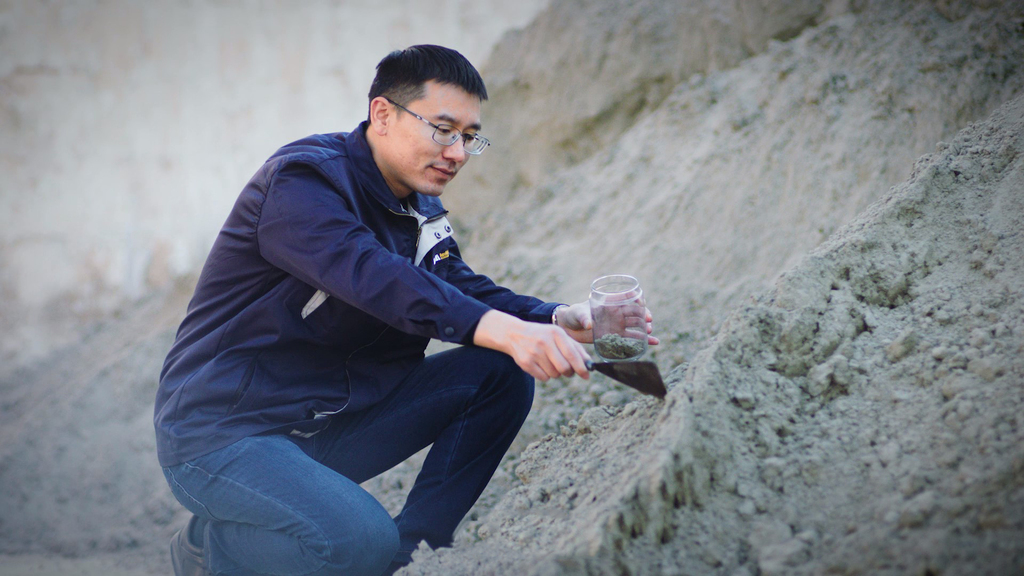
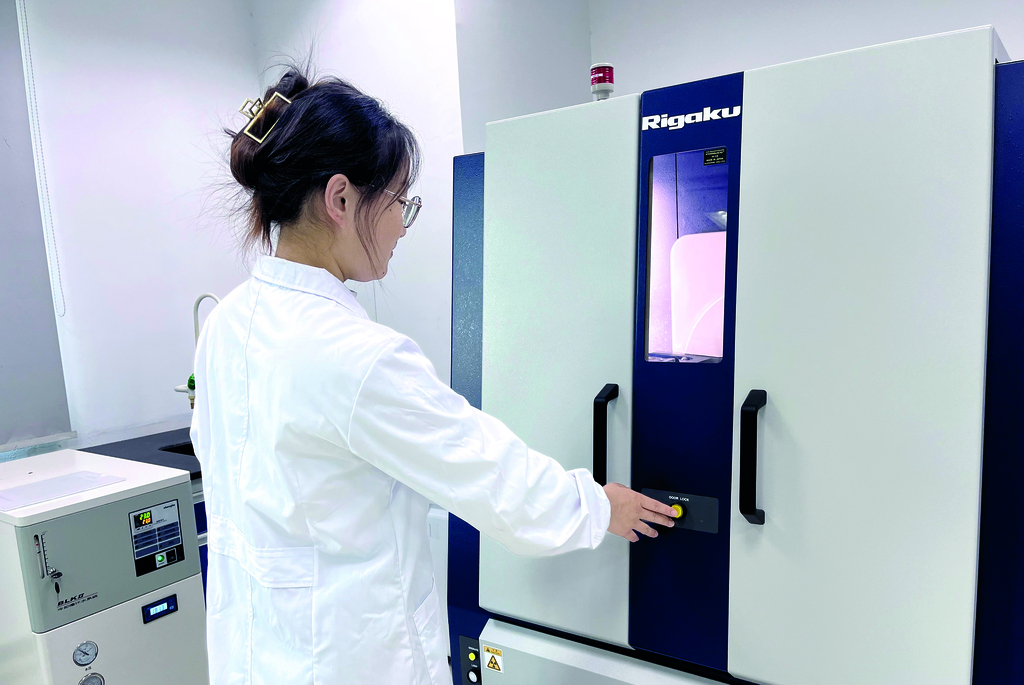
"We are deeply moved by the systematic services provided by Keda, especially in the emerging market of AAC in Uzbekistan, where there is still a lack of understanding about this building material. Over the past two years, stimulated by policies and market demand, we began to learn and understand this product and its related applications. We are delighted to have encountered Keda Suremaker in this process. Despite the long distance, Keda's process experiment team still provided us with excellent service. Even during the pandemic, when cross-border travel was extremely difficult, they arranged for their team to come to Uzbekistan to conduct training for us. They helped us understand the production process and produce high-quality products. Their sincere work attitude and dedication showed us their commitment to cooperation. These process-related services made us feel that collaborating with them was the right decision. Now, we can stably produce high quality AAC blocks and panels, which are sold to the entire Central Asian region", said Baurzhan Baimukhanov, Head of Ecoton Group.
"Keda has always been contemplating how to provide the most practical services to our clients, as the needs of customers in different markets are not the same. In some markets, customers are familiar with AAC products, allowing us to learn from each other and share experiences in AAC production and management. However, in other markets, which are entirely new, there is a lack of understanding of AAC. This makes Keda Suremaker feel a great sense of responsibility, as this is not just about business expansion; we also inadvertently bear the hidden mission of promoting and facilitating the development of AAC locally. On one hand, establishing the first production line locally is crucial in terms of its importance and symbolic significance. The quality of the production line and the AAC products often also indicates whether the industry can develop sustainably in that market. On the other hand, we need to enhance the local awareness of AAC and ensure that the quality of this emerging industry's products is influential enough to impact the market. Therefore, we pay extra attention to the implementation of services in emerging markets. We hope to achieve success through joint efforts with our clients and help the AAC industry to grow locally, as we all know AAC is a very low-carbon and environmentally friendly product. As much as possible, we arrange for our service personnel to go to the project site. For example, when we were establishing the first production line in Taiwan, China, there were no AAC production lines on this island. To jointly create the region's first production line and help local clients learn the production process and produce without problems, our team has been stationed locally from the early stages of the project until the client could produce smoothly." said the Managing Director of Keda Suremaker, Mr. Chadwick Chen.
Currently, the utilization of sand and fly ash is very comprehensive internationally, but there are not many AAC production lines for the utilization of other solid wastes. Keda Suremaker, with its rich practical experience, hopes to solve related problems for more clients and contribute to environmental development. The Keda Suremaker Process Experimental Center is equipped with a chemical analysis room, an instrument room, and a process room, featuring sophisticated experimental instruments like scanning electron microscopes, X-ray diffractometers, and laser particle size analyzers. Keda can conduct specialized experimental analyses such as particle size analysis, spectroscopic analysis, chemical analysis, phase analysis, and micro-morphological analysis. The company provides comprehensive services to its clients, including raw material analysis, process experiments, on-site production guidance, and personnel training, supporting the entire lifecycle. Keda´s AAC production lines have covered regions including Europe, Southeast Asia, the Middle East, South Asia, and South America. Keda maintains close communication and cooperation with well-known design institutes in the building materials industry, professional research institutions, domestic and international industry associations, and other related organizations. Keda looks forward to exploring the utilization of solid waste together with customers, aiming to promote the reduction of carbon emissions in the AAC industry.